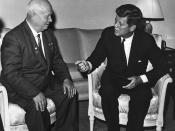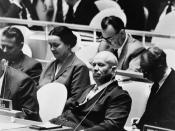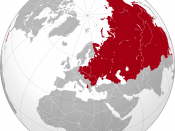Nikita Khrushchev became the leader of the USSR after the death of Stalin in 1953, but he had a very different style of leadership compare to Stalin's on international political views. He believed in Peaceful Coexistence and more relaxed atmosphere in communist states through Destalinisation. Even though partly it was successful, but it also brought reformers in Czechoslovakia, East Germany and Hungary between 1953 to 1960.
Peaceful Coexistence was introduced by Khrushchev in late 1950's. This policy meant to accept the existence of both capitalism and communist, rather than use force to destroy each other. To show this, he did not only stop Soviet influence and withdrew troops from Austria and made it neutral in 1950's, but also attend international peace conferences, such as the Geneva Summit, and by travelling internationally, such as his trip to America in 1959, also the World Peace Council founded in 1949 was largely funded by the Soviet Union to organize a peace movement in favour of the concept internationally.
He disliked Stalin's use of terror and his economic policies of concentrating on heavy industry and forcing collectivisation in agriculture. He introduced the concept of Destalinisation which gave less pressures on its country and other communist states, for example he told Yugoslavian leader Tito there are ways to communism. Through this, he wished to promote better relations with the West. His criticism of Stalin's hard line approach encouraged some communists in the eastern bloc to push for liberalisation in their own countries. In June 1953 there were riots in Czechoslovakia, people burnt down Soviet flags and sacked the town hall. This is quickly put down but encouraged strikes breaking out across East Germany when the government tried to impose wage cuts. To restore order, Soviet troops went in and arrested 25,000 people, 400 killed. These...


